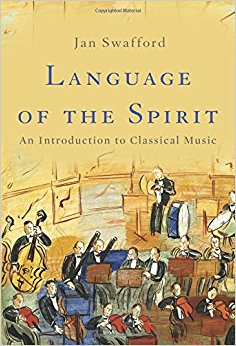
I’m always looking for well-written guides to complicated subjects. Language of the Spirit: An Introduction to Classical Music provides a handy one-volume book that covers the subject in enough detail to satisfy my needs. Swafford provides witty commentary and intriguing anecdotes about the composers. And at the end of each chapter, Swafford suggests musical pieces for further listening. If you’re looking for a concise, insightful commentary on great music, Language of the Spirit accomplishes those goals with a breezy style. GRADE: A
TABLE OF CONTENTS:
Table of Contents
Introduction vii
Part I Music from the Beginning
Chapter 1 Through the Middle Ages (up to 1400) 3
Chapter 2 The Renaissance (ca. 1400-1600) 13
Part II Baroque
Chapter 3 The Baroque Period (ca. 1600-1750) 19
Chapter 4 Claudio Monteverdi (1567-1643) 27
Chapter 5 Johann Sebastian Bach (1685-1750) 31
Chapter 6 George Frideric Handel (1685-1759) 44
Chapter 7 Further Baroque Listening 52
Part III Classical
Chapter 8 The Classical Period (ca. 1750-1830) 57
Chapter 9 Joseph Haydn (1732-1809) 66
Chapter 10 Wolfgang Amadé Mozart (1756-1791) 77
Chapter 11 Ludwig van Beethoven (1770-1827) 91
Part IV Romantic
Chapter 12 The Romantic Period (ca. 1830-1900) 107
Chapter 13 Franz Schubert (1797-1828) 114
Chapter 14 Hector Berlioz (1803-1869) 126
Chapter 15 Robert Schumann (1810-1856) 133
Chapter 16 Frédéric Chopin (1810-1849) 140
Chapter 17 Richard Wagner (1813-1883) 145
Chapter 18 Franz Liszt (1811-1886) 155
Chapter 19 Johannes Brahms (1833-1897) 159
Chapter 20 Pyotr Ilich Tchaikovsky (1840-1893) 170
Chapter 21 Antonín Dvorák (1841-1904) 175
Chapter 22 Gustav Mahler (1860-1911) 179
Chapter 23 Further Romantic Listening 186
Part V Modernism and Beyond
Chapter 24 The 20th and 21st Centuries (ca. 1900-present) 193
Chapter 25 Claude Debussy (1862-1918) 211
Chapter 26 Richard Strauss (1864-1949) 218
Chapter 27 Maurice Ravel (1875-1937) 223
Chapter 28 Igor Stravinsky (1882-1971) 229
Chapter 29 Arnold Schoenberg (1874-1951) 240
Chapter 30 Charles Ives (1874-1954) 250
Chapter 31 Bela Bartok (1881-1945) 258
Chapter 32 Dmitry Shostakovich (1906-1975) 266
Chapter 33 Benjamin Britten (1913-1976) 273
Chapter 34 Aaron Copland (1900-1990) 277
Chapter 35 György Ligeti (1923-2006) 281
Chapter 36 Further Modernist Listening 286
Conclusions 298
Suggested Further Reading 304
Index 306
The list of composers makes me kind of proud – so many Germans and Austrians on it!
But over the centuries other countries of course have also produced many geniuses … 🙂
Wolf, I listen to Mozart almost every day!
Not really my thing, but it sounds interesting and it is definitely the kind of book I enjoy. There are a few of my favorites on the list (not Liszt), of course, though I am far from an expert on classical music in general. (OK, Mozart and Beethoven top my list.)
Jeff, LANGUAGE OF THE SPIRIT motivated me to seek out new music. I’m sure it would do the some for you!
I used to have lots of classical music on vinyl—much of it of the “Columbia House Collection” variety, but I must admit it provided a good introduction. When we migrated to CDs, I got some of the “pantheon” (Bach, Beethoven, Mozart, etc.), but never replaced everything. I love medieval and renaissance music and have quite a few CDs of that type. However, in general, I seem to know more about classical music than I can identify specific composers and pieces.
Deb, I love to listen to Vivaldi every so often. I first listened to them on a set of TIME-LIFE albums my family had. It’s amazing how early experience with classic music stays with us!
As usual this reminds me of Karl Haas. Everything I know (and it is not much) I learned from him.
Patti, you’re right. LANGUAGE OF THE SPIRIT follows in the great Karl Haas tradition of ADVENTURES IN GREAT MUSIC!
I caught Haas’s series at the of his career. Anthony Boucher’s opera series for Pacifica Radio was on all sorts of Pacifica affiliates and other community/public statins across the country.
Hell, I was a 20th Century “classical” djmyself with my SWEET FREEDOM radio series (WGMU Fairfax, VA 1987; WCXS/WEBR, Merrifield, VA 1989-95; WPPR. Philadelphia 1996-97…mostly mid-century and later, up through the likes of Penderecki and Van de Vate…
And I’ve played, atrociously, early music in a high school brass choir.
I have a lot of books of this sort, have read or at least skimmed most of them, and after a while the stock portrayals and surveys of the major composers run to canned Received Opinion & same old same old. There’s one exception. It’s nominally a classical recordings buyers guide, like the Penguin & Gramophone ones, but it’s one man’s opinion, and his pithy characterizations of the Great Composers & their music – insightful, not always worshipful, and frequently hilarious – make it the one that I pick up again and again for casual browsing. It’s Jim Svejda’s The Record Shelf Guide to Classical CDs & Audiocassettes. I have the 5th edition, 1996, and have no idea whether it’s run to later editions, but it should be readily available used in the various editions. The only thing he’s weak on is sonics evaluation from the audiophile perspective, but I can find that elsewhere.
Art, Jim Svejda’s THE RECORD SHELF radio program used to be broadcast by our local NPR station. But, about 10 years ago, THE RECORD SHELF disappeared from our local station.
I’ll take a look for Svejda…thanks, folks…
I’m a big fan of classical music, especially doo-wop and rockabilly!
Bob, the Meyersons just attended a doo-wop concert!
I have a fat volume of GB Shaw’s music criticism awaiting me at bedside…